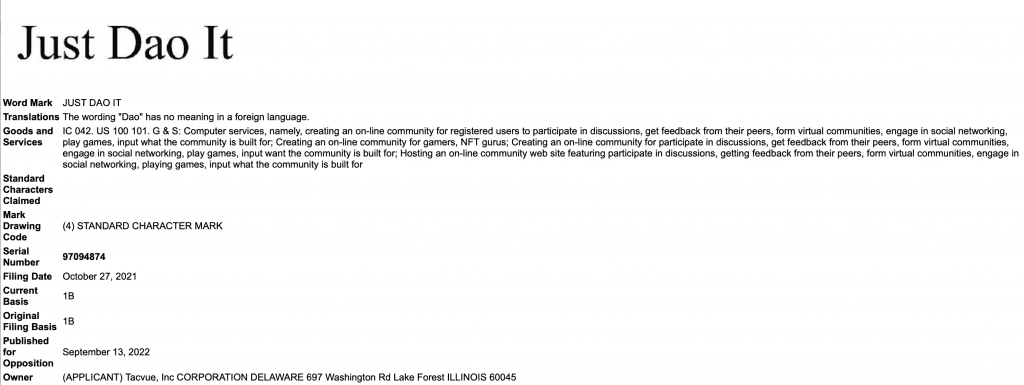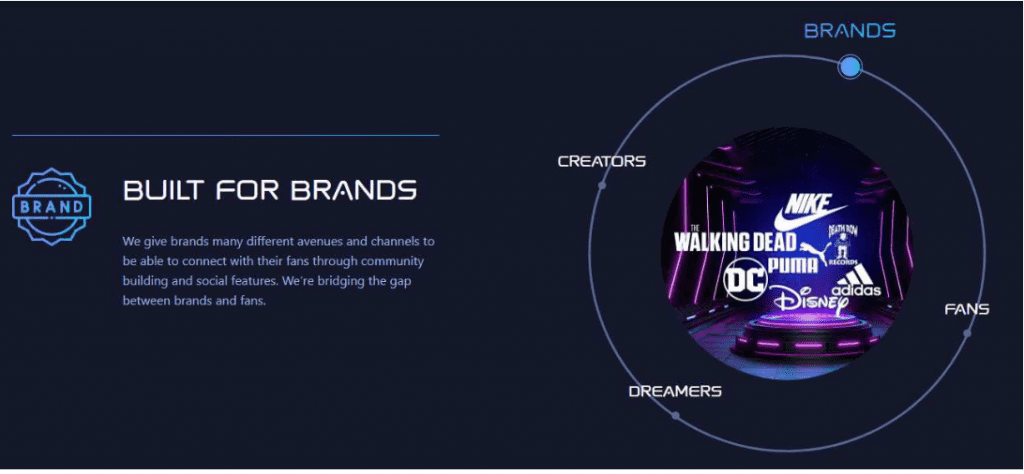Nike is looking to block the registration of a trademark that plays on its famed “Just Do It” slogan. In the opposition that it initiated with the U.S. Patent and Trademark Office’s Trademark Trial and Appeal Board (“TTAB”) on Tuesday, counsel for Nike asserts that the sportswear giant stands to be damaged if Tacvue, Inc.’s application for JUST DAO IT is registered by the trademark office. The Chicago-based tech company revealed in its October 27, 2021 application that it intends to use the mark in connection with “computer services, namely, creating an online community for registered users” – including “gamers [and] NFT gurus” – to “participate in discussions, get feedback from their peers, form virtual communities, engage in social networking, play games,” etc.
Nike is pushing back against Tacvue’s web3-centric trademark application, asserting that JUST DAO IT is confusingly similar to the JUST DO IT mark, which it has continuously used since “at least as early as 1989 in connection with various clothing items” and for which it maintains federal registrations and common law rights. Not limited to tangible goods and services, such as apparel and footwear, Nike argues that its rights in the mark extend to the digital world, as it has “long used JUST DO IT on social media to build community and to connect with” consumers. At the same time, Nike says that it uses its trademarks in connection with “downloadable mobile applications … that offer social networking, community-building, and/or interactive feedback elements.” For example, through its NIKE RUN CLUB App, Nike contends that it “offers programs that allow Nike customers to ‘connect with friends and other runners through experiences and challenges.’”

Beyond that, Nike claims that it also maintains trademark rights in the virtual/web3 world, as it “has expanded into the fields of virtual goods and services, such as non-fungible tokens (‘NFTs’), as well as online forums for discussing NFTs and other digital collectibles.” Among other things, it points to the trademark application for registration (Ser. No. 97096236) that it lodged with the U.S. Patent and Trademark Office (“USPTO”) on October 27, 2021 on an intent-to-use basis for “JUST DO IT” for “[d]ownloadable virtual goods, namely, computer programs featuring footwear,” etc., “retail store services featuring virtual goods,” etc., and “entertainment services, namely, providing online, non-downloadable virtual footwear, clothing, etc. (Note: Both Nike and Tacvue filed their respective intent-to-use metaverse/NFT-focused applications with the USPTO on the same day in October 2021.)
And regardless of the medium, the Beaverton, Oregon-based sportswear giant asserts that its rights extend beyond unauthorized uses of “JUST DO IT” – which it argues “has become a core part of [its] identity” after more than 30 years of use – to other iterations of the “famous” mark. The Swoosh cites an array of successful efforts to block the registration of similar marks, such as JUST JESU IT, JUST DID IT, JUSTSAYIT, JUST DREW IT!, and JUST BELIEVE IT, on the grounds of likelihood of confusion and dilution.
With these rights in mind, Nike alleges that Tacvue’s JUST DAO IT mark (Ser. No. 97094874) is “confusingly similar” to its own well-known mark, and that such potential for consumer confusion is only heightened by the fact that Tacvue uses Nike’s name and swoosh logo on its website, touting its offerings as being “built for brands.” According to Nike, Tacvue’s display of the Nike marks on its website – “in a manner that is likely to create the mistaken impression that [it] is sponsored or endorsed by [Nike]” – not only demonstrates Tacvue’s “knowledge of [Nike] and its marks,” but increases the likelihood that Tacvue’s JUST DAO IT mark will cause consumer confusion.
In light of “the similarity of the marks and goods and services involved,” Nike states that registration of Tacvue’s mark should be denied based on a likelihood of confusion, and the likelihood that the mark will cause dilution of the JUST DO IT mark by diluting its distinctiveness and lessening its capacity to identify and distinguish Nike’s goods and services from those of others.

THE BIGGER PICTURE: Nike’s opposition comes amid an enduring push by companies to test the waters of web3, raising a plethora of nuanced trademark questions in the process. The goods/services at issue here are “computer services, namely, creating an on-line community for registered users,” which fall more neatly in the realm of web2 (where Nike has been operating consistently – and building trademark rights – for more than two decades) than in the pool of metaverse and web3-focused applications that have flooded trademark offices over the past few years.
It is worth noting that even if Tacvue were looking to register JUST DAO IT for use on virtual goods/services, Nike would still be in a strong position to oppose. However, Nike is something of an outlier (to some extent) in that has been an early-adopter of various facets of web3, making actual use of its various marks in the virtual world via NFTs and in gaming environments like Roblox. Not all brands have done so, which could prove problematic should they seek to enforce their marks against infringers in the virtual world.
Chances are, at least well-established brands will have little issue making infringement and/or dilution cases in response to unauthorized uses of their marks in the metaverse and/or in connection with NFTs, and/or pushing back against parties that are looking to amass registration for their marks for use in the quintessential metaverse classes of goods/services regardless of whether the brands, themselves, are actually offering up NFTs or are operating on metaverse platforms – due to their status as well-established brands.
From a USPTO POV, we have seen this in action with two applications filed – by unaffiliated individuals – for Gucci and Prada for use on “downloadable virtual goods, namely, computer programs featuring footwear, clothing,” etc., “retail store services featuring [such] virtual goods,” and “entertainment services, namely, providing on-line, non-downloadable virtual footwear, clothing,” etc. In September, USPTO examining attorneys preliminarily refused to register the Gucci and Prada marks, including because of a likelihood of confusion between the applied-for marks and the valid (non-web3-related) trademarks held by Gucci and Prada, brands that the examining attorneys states are “so well-known that consumers would presume a connection” between them and the fling parties when one does not exist.
Part of the message sent by the examiners: The USPTO seems willing to parlay well-known brands’s “real world” trademark rights into the metaverse/web3 segment and find that they are applicable to virtual goods and services – absent registrations for – and potentially, even actual use in – the virtual world.
This mirrors some early opinions from courts, with the Hermès v. Mason Rothschild case, for one, standing out, as Judge Jed Rakoff refused to toss out Hermès’s trademark infringement and dilution lawsuit this spring. The court’s order suggests that the trademark rights that brands like Hermès have amassed for use on purely physical goods (and “real” world services) could extend into the metaverse/web3 and allow for infringement claims. (Hermès, after all, has yet to make use of the protected Birkin name or trade dress in connection with any virtual products or NFTs, but that seemingly does not stop its existing “real world” rights from applying in the virtual world.)
We can expect more answers shortly, with the court due to elaborate on its unwillingness to grant either Hermès or Rothschild’s motion to dismiss, and a trial slated to commence on January 30.
UPDATED (Mar. 1, 2023): Tacvue has failed to respond, prompting the TTAB to issue a notice of default.











